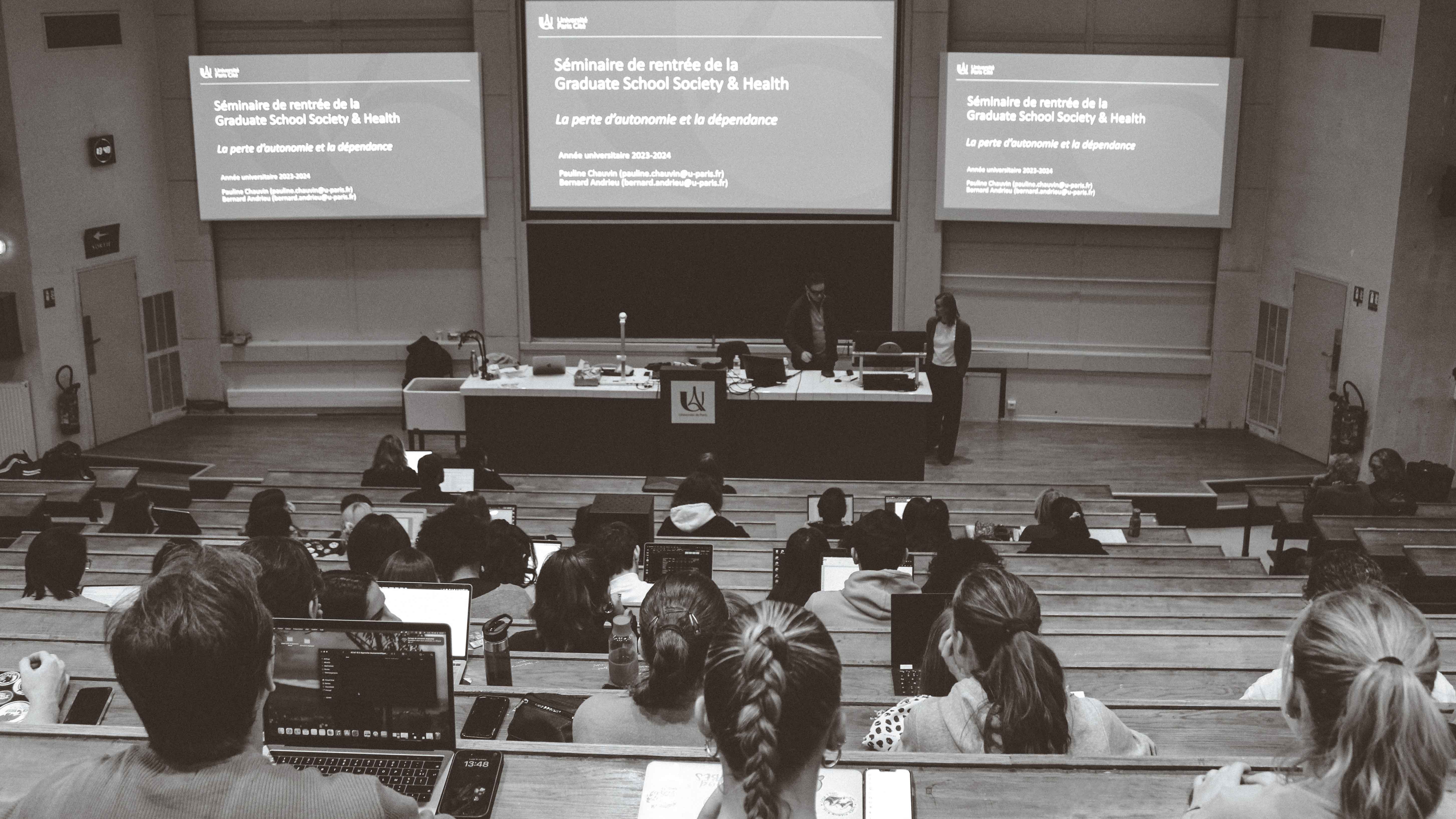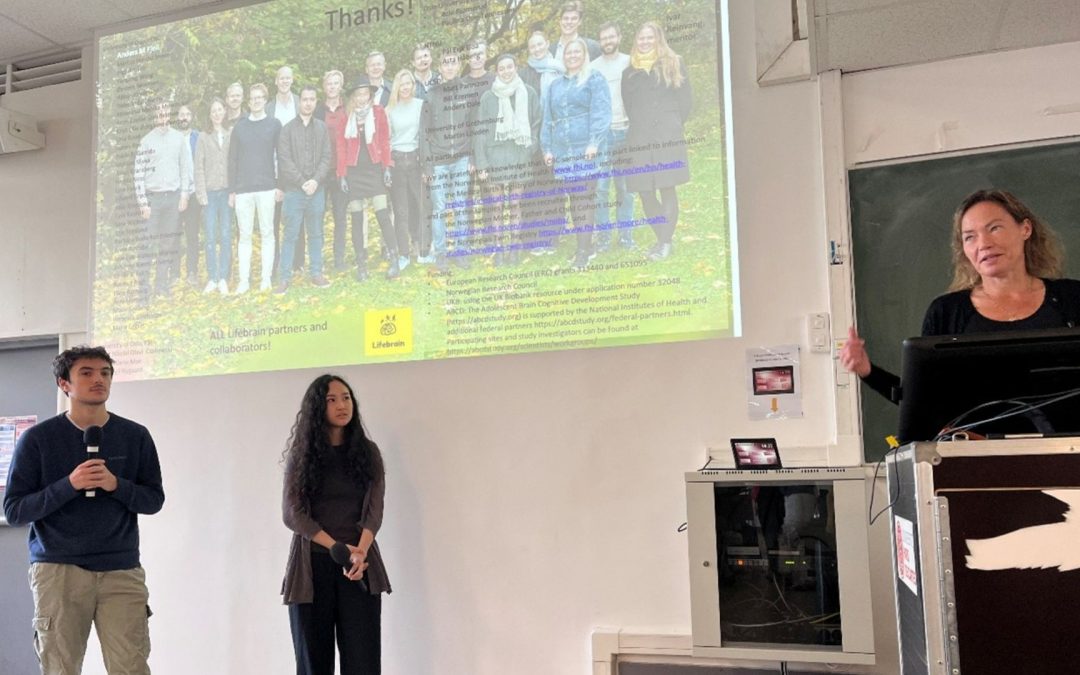Society & Health
The Graduate School of Society & Health brings together the Université Paris Cité’s Master’s programmes in humanities and social sciences whose main subject of study is health. The Graduate School offers a multidimensional and multidisciplinary approach to studying our health system.


Back-to-School Seminar for the Graduate School of Society & Health
October 16, 2023, in Paris.
© Camille Perrin
Presentation
The issues surrounding the French population’s health and its system are at the heart of our society’s concerns and have been exacerbated since the beginning of the COVID-19 pandemic. These issues involve many actors, interacting in a system where regulation and financing are complex. To studying our health system, this complexity requires a multidimensional and multidisciplinary approach.
The Graduate School of Society & Health aims to develop an interdisciplinary research training centre to study our health system. It aims to bring together Master’s degree courses in the humanities and social sciences with an interest in health in order to facilitate exchanges and collaborations between disciplines and to encourage the pursuit of PhD studies.
The ambition of the Graduate School of Society & Health is to increase the visibility of humanities and social sciences in the field of health. This field of study and research is still underestimated today. Society and mentalities are evolving, and public authorities need to better integrate the fact that the patient is not only a patient, but a person who has rights and preferences and who must be respected as a subject of ethical, sociological and economic reflection.
Contact
Pauline CHAUVIN
pauline.chauvin@u-paris.fr
Masters
The courses are taught in French and English.
- Adapted physical activities and health:
- Ethics:
- Health Economics
- Health law:
Research
Laboratories
- CEPED – Centre Population et Développement (UMR 196)
- CERLIS – Centre de Recherche sur les Liens Sociaux (UMR 8070)
- Cermes3 – Research Centre for Medicine, Science, Health, Mental Health and Society (UMR CNRS 8211)
- ETRES – Ethics, research, translation (Centre de Recherche des cordeliers – UMRS 1138)
- I3SP – Institute of Sport and Health Sciences of Paris (URP 3625)
- IDS – Law and Health Institute (UMRS 1145)
- Institut la Personne en médecine
- LIRAES – Interdisciplinary Laboratory for Applied Research in Health Economics (URP 4470)
- SPHERE – Science, Philosophy, History (UMR 7219)
Executives
- Prof. Bernard ANDRIEU
Director of the Graduate School of Society & Health
Professor at Université Paris Cité - Pauline CHAUVIN
Director of the Graduate School of Society & Health
Senior Lecturer HDR
Deputy Director of Laboratoire Interdisciplinaire de Recherche Appliquée en Économie-Gestion et Santé (LIRAES)
À lire aussi

Interdiction des réseaux sociaux aux moins de 15 ans : ce que dit la recherche
L’Assemblée nationale a adopté, le 26 janvier 2026, la proposition de loi interdisant l’accès aux réseaux sociaux aux moins de 15 ans. Face aux inquiétudes liées au cyberharcèlement, à l’isolement ou à la désinformation, Grégoire Borst, professeur de psychologie du...

Lancement du nouvel ouvrage de Pinar Selek : Lever la tête. La recherche interdite sur la résistance kurde
Cette soirée de lancement se déroulera le 16 février 2026 à 18h, à l’Université Paris Cité, Grand Amphithéâtre, situé 12 rue de l’École de Médecine, en présence d’Édouard Kaminski, président de l’Université Paris Cité. Pinar Selek revient pour la première fois sur sa...

INC Day 2025: an international scientific day dedicated to neuroscience
The Neuroscience and Cognition Institute of Université Paris Cité (INC) organized a new edition of the INC Day, focused on neurodevelopmental trajectories. A key partner of the event, the Graduate School Neuroscience invited its first year and second year master...

INC Day 2025 : une journée scientifique internationale dédiée aux neurosciences
L’Institut Neuroscience et Cognition d’UPCité (INC) a organisé une nouvelle édition du INC Day, centrée sur les trajectoires neurodéveloppementales. Partenaire clé de l’événement, la Graduate School* Neuroscience a convié ses étudiantes et étudiants en M1 et M2...
